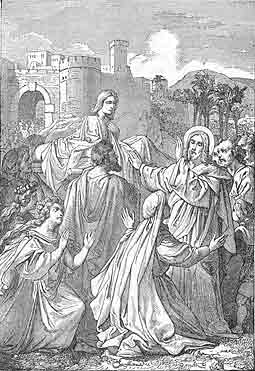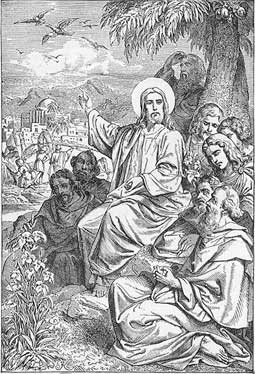The Introit of the Mass is a fervent prayer; which may be said in every necessity and adversity:
INTROIT Bow down thine ear, O Lord; to me, and hear me: save thy servant, O my God, that hopeth in thee: have mercy on me, O Lord, for I have cried to thee all the day. Give joy to the soul of thy servant: for to thee, O Lord, I have lifted up my soul. (Ps. IXXXV.) Glory etc.
COLLECT Let Thy continued pity, O Lord, cleanse and defend Thy Church: and because without Thee it cannot abide in safety, govern it ever by Thy gift. Thro'.
EPISTLE (Gal. V. 25, 26.; vi. I-Io.) Brethren, If we live in the Spirit, let us also walk in the Spirit. Let u5 not be made desirous of vain-glory, provoking one another, envying one another. Brethren, and if a man be overtaken in any fault, you, who are spiritual, instruct such a one in the spirit of meekness, considering thyself, lest thou also be tempted. Bear ye one another's burdens, and so you shall fulfil the law of Christ. For if any man think himself to be something, whereas he is nothing, he deceiveth himself. But let every one prove his own work, and so he shall have glory in himself only, and not in another. For every one shall bear his own burden. And let him that is instructed in the word, communicate to him that instructeth him, in all good things. Be not deceived; God is not mocked: for what things a man shall sow, those also shall he reap. For he that soweth in his flesh, of the flesh also shall reap corruption: but he that soweth in the spirit, of the spirit shall reap life everlasting. And in doing good, let us not fail: for in due time we shall reap, not failing. Therefore, whilst we have time, let us work good to all men, but especially to those who are of the household of the faith.
EXPLANATION This epistle is taken, like that of the Sunday before last, from the epistle of St. Paul to the Galatians, in which St. Paul shows them the insufficiency of the Jewish law, and that they can only be saved by a lively faith in Christ, but now he admonishes them to the performance of good works. You now live, he tells them, in the Spirit, that is, the Holy Ghost animates your heart by His grace, enlightens, confirms, and inflames you, admonishes and teaches you, impels your heart to do good; you must, therefore, also regulate your external conduct accordingly, and in particular devote yourself to the practice of humility and charity, as the foundations of a truly spiritual life. Humility must teach and move you to think little of yourself, to avoid vain glory, and not to confide in your own strength. But charity should impel you to be meek and compassionate to all, even sinners, to correct them charitably, and lead them back to the path of virtue; since he who is harsh to the erring, despises and treats them roughly, is often permitted by God to fall into the same, nay, even into greater sins.
Particularly you must show your charity one for another, that one bears the burdens of the other: that you bear the faults and imperfections of others just as patiently as you wish others to bear with your own imperfections; thus you will fulfil the law of Christ, which commands us to love our neighbor; you will prevent many sins which are occasioned by considering yourself perfect, raising yourself above others, criticising their failings, and causing disturbance. True glory consists in knowing ourselves, our faults and evil inclinations, and in eradicating them. Be grateful to those who instruct you in the word of God, and give to them willingly of your earthly possessions. What you sow, you shall reap; if you only follow the dictates of the flesh, do not mortify yourself, do not correct your failings, and indulge your sinful appetites, you will one day reap death, destruction and damnation, whereas, on the contrary, if you follow the dictates of the Holy Ghost, you will reap of the Spirit of life.
Let us obey this doctrine, for it is of interest to us, and impress deeply on our heart that without mortification of body and soul we cannot be saved.
ASPIRATION. O. St. Paul! beg of God the grace for me, that I may always walk in humility, and the love of my neighbor, particularly in bearing with his imperfections and failings, and thus fulfil the law of Christ in this as in all things.
 GOSPEL (Luke VII. 11-16.) At that time, Jesus went into a city called Naim: and there went with him his disciples, and a great multitude. And when he came nigh to the gate of the city, behold a dead man was carried out, the only, son of his mother, and she was a widow, and a great, multitude of the city was with her. Whom when the Lord had seen, being moved with mercy towards her, said to her: Weep not. And he came near, and touched the bier. And they that carried it stood still. And he said: Young man, I say to thee, Arise. And he that was dead sat up,. and began to speak. And he delivered him to his mother. And there came a fear on them all; and they glorified God, saying: A great prophet is risen up amongst us, and God hath visited his people.
GOSPEL (Luke VII. 11-16.) At that time, Jesus went into a city called Naim: and there went with him his disciples, and a great multitude. And when he came nigh to the gate of the city, behold a dead man was carried out, the only, son of his mother, and she was a widow, and a great, multitude of the city was with her. Whom when the Lord had seen, being moved with mercy towards her, said to her: Weep not. And he came near, and touched the bier. And they that carried it stood still. And he said: Young man, I say to thee, Arise. And he that was dead sat up,. and began to speak. And he delivered him to his mother. And there came a fear on them all; and they glorified God, saying: A great prophet is risen up amongst us, and God hath visited his people.
Why did Christ show compassion to this widow?
To convince us that God takes sorrowful and destitute widows under His protection; and is to them a consoler and helper; and to teach us to do the same. Woe, therefore, to those who oppress them and cause them to weep. The tears and cries of widows will ascend to God, who will terribly punish the injuries inflicted upon them. (Exod xxii. 22. 23.)
Christ had still other reasons for compassion, for He saw in this deceased youth the death of sinners, and in the afflicted mother the pain which the Church experiences at the spiritual loss of so many of her children. Should this not also awaken our sympathy since it wad the principal cause which moved our Saviour to compassion. I£ we are faithful children of our mother, the Church, it is impossible for us not to share her sorrow, and we would surely not be her children, if we could contemplate without sorrow the multitude who daily die the death of sin, and thus separated from the living body of Christ, hasten to eternal destruction. O let us with the Church unceasingly, ask Jesus, that He raise sinners from their spiritual death, enlighten those in error so that all recognize the truth, find, and walk the path Which leads to life !
Why did Christ say to the widow: Weep not?
He wished to moderate her excessive sorrow, and to teach us that we should not mourn for the loss of our relatives, like the heathens who have no hope of resurrection to eternal life. (Thess. iv. I a.) Resignation to the will ofGod, with prayer and good works, will be of more use to the dead than many tears.
What else do we learn from this gospel?
That no one, however young and healthy, will escape death, wherefore we should always be prepared to die.
INSTRUCTION CONCERNING DEATH
IF there were locked up in prison several hundred persons, on whom sentence of death had irrevocably been pronounced, yet who knew not the day or hour of their execution; if one after the other, and often he who least expected it, were taken out to be executed; would not each one's heart tremble, whenever the prison door opened? Now the irrevocable sentence of death is pronounced on us all; we are all locked up in our bodies, as in a prison; (Ps. cxiv. 8.) one after the other is called hence, yet we do not regard it. We live as though we could live forever; we think only of the body, but for the soul nothing is done, except that we load it with sins and vices.
Is this rational? The body will be food for worms, but the soul (without knowing when) will travel into the house of eternity, to which place she must bring treasures of good works, in order to live happy for ever. Who would, therefore, be so foolish as to care only for the body during life, and neglect the salvation of the soul?
O man, says St. Francis of Sales, (Phil. part. i. chap. 13.) represent to yourself in lively colors, that at your death the world will cease to exist with respect to you. In that last hour the pleasures, the vanities, the riches, the honors, the friendships, and all that was dear to you, will disappear before your eyes as so many shadows. O fool that I am! you will then say, for what trifles and fooleries have I lost all! On the contrary, piety, good works, penance, etc., will appear pleasant to you, and you will exclaim: O, why did I not travel on this blessed roadl Then the sins which you now consider as mere trifles, will seem to you like mountains, and all that you thought you had accomplished as, great things, with regard to piety, will seem to you very little.
What terrible fear will then seize your soul, when she must travel alone into the bottomless abyss of eternity which, as St. Bernard says, devours all possible, imaginable ages, and of which St. Gregory says, that we can easier say what it is not than what it is. What terrors will befall her, when she must appear before the tribunal of that God whom she never really loved and honored in her life-time and before whom she must now give the strictest account, and hear an irrevocable and just sentence!
Should not these thoughts make an impression upon you? How can you escape this terrible future? By living now, as you would wish to have lived at the hour of death. Die daily with St. Paul by crucifying the flesh and its lusts and by voluntarily withdrawing your heart from the world, its pomps and vanities, before death will do this by violence.
RESOLUTION O world! because I cannot know the hour, in which I must leave you, I will not be attached to you. O you dear friends and relatives, you, too, I will in future love only with a holy inclination, directed to God, which will not cease with death, but remain forever. O Lord! help me, that I may die totally to myself and the world, and live only for Thee, and partake of eternal happiness.
(Rev. Fr. Leonard Goffine's The Church's Year)


























